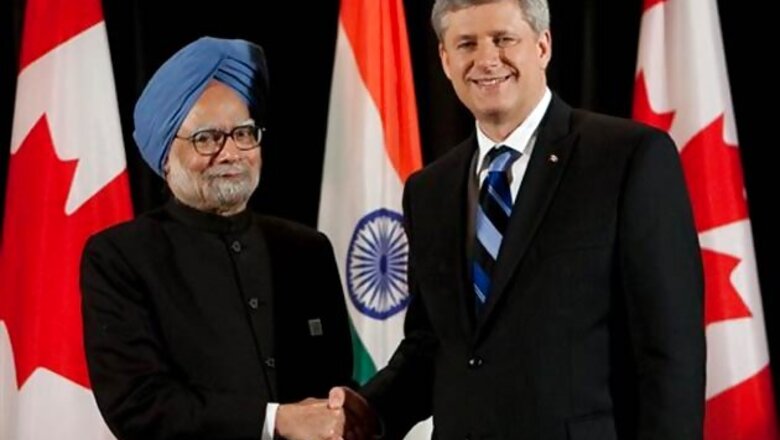
views
New Delhi: Canadian firms will soon be able to export uranium and nuclear reactors to India for the first time in almost four decades following an agreement between the two countries, Canadian Prime Minister Stephen Harper said on Tuesday.
It will end a penalty Canada imposed in 1976 after India secretly exploded its first nuclear bomb in 1974, commonly called "Smiling Buddha", using material from a Canadian-built reactor in India.
"Being able to resolve these issues and move forward is, we believe, a really important economic opportunity for an important Canadian industry, part of the energy industry, that should pay dividends in terms of jobs and growth for Canadians down the road," Harper said during a visit to New Delhi.
He gave no timeline for implementation of the new deal. The two countries signed a nuclear cooperation pact two years ago, but until now had not agreed on the final details.
India aims to lift its nuclear capacity to 63,000 MW in the next 20 years by adding nearly 30 reactors. The country currently operates 20 mostly small reactors at six sites with a capacity of 4,780 MW, or 2 per cent of its total power capacity, according to the Nuclear Power Corporation of India Limited.
It was not immediately clear what safeguards there would be to ensure that Canadian material does get used again for making nuclear bombs, an issue that had been a key obstacle to the agreement.
Canada's ambassador to India, Stewart Beck, said on Monday that his country wanted to be able to track all nuclear material, but that India felt it only needed to report to the International Atomic Energy Agency.
Harper said the Canadian nuclear safety commission had worked to "achieve all of our objectives in terms of non-proliferation"
Canada is in a race against Australia, its strategic ally but a commercial rival in the uranium business. Australia is also trying to nail down safeguards under which it too could sell uranium to India.
Opening up the huge Indian market would be a major benefit to Canada's Cameco Corp, the world's largest publicly traded uranium producer.
Another potential beneficiary is Canadian engineering firm SNC Lavalin (SNC.TO), which bought the government's commercial nuclear division, which designed the Candu reactor that is in use in numerous countries.
Harper also said Canada welcomed foreign investment, after the country temporarily blocked Malaysian state oil firm Petronas' $5.17 billion bid for gas producer Progress Energy Resources on October 20.
Late on Friday, Canada extended to December 10 its review of a $15.1 billion bid made in July by China's CNOOC Ltd for Canadian energy producer Nexen Inc.


















Comments
0 comment